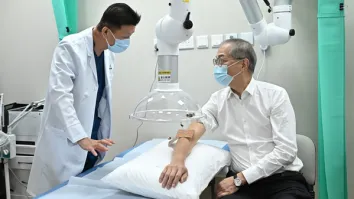How to stop the nursing bleed on the frontlines
By Robert NievesNurses are the backbone of our health system; 27.9 million people across the globe. They are among the many healthcare workers at the frontline who are becoming physically and mentally exhausted with overcrowded hospitals, staff shortages, and a rising death toll.
According to a report by the International Centre on Nurses Migration (ICNM), the ideal nurse- to-population ratio is 1:300. However, the pandemic has further intensified a drastic shortage of trained nurses. The consequences of this shortage could be dire, with severe impacts on the quality of patient care that nurses can deliver. Now more than ever, nurses need support to deliver quality care as they continue to put the health of their patients before their own.
Ease their burden by embracing technology
One of the most pronounced nursing shortages can be seen in India, where the current nurse-to-population ratio stands at 1:670, compounded by the longstanding issue of the outflow of nurses to high-income countries. This is an opportunity for telehealth technologies to help ease the burden in a strained healthcare system. When hospital resources are overwhelmed with treating more severe cases, telehealth technologies allow nurses to continue providing remote care for patients with milder symptoms.
To encourage widespread adoption of telehealth services, we need to ensure that healthcare institutions are digitally ready to share and access patient data. India has already laid the foundation for a digital health ecosystem with the launch of the National Digital Health Mission.
By integrating existing electronic health record systems with clinical decision support tools, nurses will have access to a variety of care guidance materials, such as medical reference databases and evidence-based care plans to provide the best remote care to patients.
Encourage the entry of retired nurses, nursing graduates
With an overstretched, overworked healthcare workforce, healthcare institutions across the globe are appealing to healthcare professionals who have left the field to return to practice. In addition, hospitals are calling on final-year nursing students to enter the practice as soon as possible.
Even as these newcomers and former nurse practitioners step up, healthcare institutions need to empower them with the latest clinical knowledge and best practices to get them up to speed and help bridge any gaps. This is important at a time when nursing resources are scarce, and every nurse is an important asset in the workforce.
Evidence-based training and online learning solutions are especially useful in raising the quality and performance of new nurses. Such training gives them the confidence to make clinical decisions, helping to relieve the burden on the existing nursing workforce. Take, for instance, Australia. The land down under launched its first fully integrated digital
hospital, St Stephen’s Hospital. They adopted Elsevier’s Clinical Skills to give nurses access to the latest COVID-19 guidelines to provide high-quality standardised care. Access to the Hub’s evidence-based resources and training solutions has equipped the nurses at St Stephen’s Hospital with the knowledge and skills to safely treat patients, allowing them to gain confidence in their skills.
Equip nursing staff with quality on-the-job training
Healthcare institutions also need to consider raising the quality of on-the-job training to equip new nurses with the necessary skills to be successful as they transition to practice.
Institutions must invest in evidence-based competency programs to ensure that nurses carry out their responsibilities according to the latest clinical and organisational standards. Such an investment will build up both individual expertise and integrated competencies.
Technology can digitalise this learning process, allowing nurses to access training resources whenever they need them, giving them confidence in their practice. At Asan Medical Center in South Korea, there is an International Nurse Observership Programme for those who are keen to explore a career in nursing. As the largest nursing organisation in Korea with approximately 3,000 nurses, participants will get to buddy a nurse, perform basic care with supervision and gain insights into the facets of nursing. Students will observe firsthand how the healthcare team collaborates to improve patient outcomes and nurses' roles in patient management through breakthrough research, forefront innovations, and higher value-added patient care interventions.
Drive change for nurses’ career development
Whether it was 25 years ago or in 2023, the primary goal of nursing education remains the same: prepare nurses to deliver safe and quality care for patients. This is a pressing need at a time when nurses need to be able to make quick, accurate, and reliable clinical decisions.
Investing in and advocating for the expansion of nursing roles has become more critical than ever. In Singapore, nurses are encouraged to engage in research and innovation to advance the nursing profession, with government funding available to develop a culture of evidence-based practice in nursing.
To attract and retain nurses, critical thinking and autonomy are key. When nurses have a voice in making clinical decisions, it provides them with a greater sense of responsibility and accomplishment. Having nurses more involved in decisions that impact patient outcomes and take on leadership roles increases their likelihood to remain engaged and motivated.
Additionally, governments and healthcare institutions need to work together to invest in nursing education programs to upskill and enhance nurses’ competencies. Not only will this translate to increased productivity and improved patient outcomes, but it can also help to attract and retain nursing talent. Organisations must also recognise the benefit of having nurses with knowledge in other areas of healthcare, such as health data analytics. Not only will additional expertise allow nurses to take on larger roles and provide more holistic, patient-centered care, but it will also lay a path forward for the future role of nurses and drive insights into how patient care impacts patient outcomes.
Conclusion
Whilst the worst of the COVID-19 pandemic may be over, nurses are continuing to tirelessly work on the frontlines and deliver the best possible care to patients. It is time that we recognise their impact on society and set them up for success, by empowering them with the knowledge and skills for professional development.
Safeguarding the interests of nurses and uplifting the profession is a joint effort and one that is only achievable with the support of educational institutions, the government, and the private sector.
By showing our appreciation for nurses and standing in solidarity with them, we can not only help stop the bleed of nurses leaving the profession but can encourage future nurses to join this selfless and gratifying vocation.




















 Advertise
Advertise








